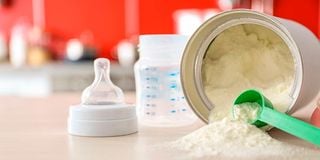Premium
Treasury blocked from charging tax on baby milk

Hospitals now require new mothers to sign consent forms before their children are given formula.
The Finance and National Planning Committee has rejected proposals by the National Treasury to impose a 16 per cent value-added tax (VAT) on milk for infants, marking another failed attempt by the State to squeeze revenue from the item.
The Treasury in its Finance Bill 2023 proposed to remove milk specially prepared for infants, from the list of tax-exempt items — a proposal that would have substantially increased the prices of the product commonly known as baby formula.
The State has made unsuccessful attempts to impose a 16 VAT on baby milk in three successive budget cycles.
The Treasury’s push for VAT on baby milk is linked to policy preference by the Health Ministry to promote exclusive breastfeeding of infants by increasing the prices of its substitutes.
The tax plans have, however, come under criticism from human rights groups and economic analysts on concern that they ignored the fact some mothers might not be able to exclusively breastfeed of unavoidable factors such as failing health.
“The policy preference by the Ministry of Health in Kenya to promote exclusive breastfeeding of infants by increasing the prices of its substitutes is informed by good intentions. However, it appears that it assumes that baby formula, a substitute for breast milk, is a luxury good that only high-income earning mothers want to purchase,” said the Institute of Economic Affairs in a commentary in September.
“It fails to acknowledge that there are mothers who need this substitute to feed their children when they are not able to supply them with breast milk due to health problems, employment conditions, or direct economic barriers.
“To raise the costs of acquisition for this substitute generates unintended consequences that harm a significant number of children based in Kenya’s urban areas,” it said.
Regulations
The State has regulations that prohibit baby formulas. For example, the Breast Milk Substitutes Regulation and Control Act of 2012 prohibits the advertisement and promotion of a designated or complementary food product, which is consistent with the 2019 National Policy for Maternal, Infant and Young Child Nutrition, the Act, and the Code, respectively.
According to these regulations, health workers in Kenya are outlawed from accepting gifts, including financial assistance, or funding for meetings, conferences, seminars, or continuing education courses, from manufacturers of infant formula or substitutes for breastmilk, which would otherwise compromise their credibility in enforcing the policy of promoting exclusive breastfeeding for infants for the recommended duration.
Read also: Baby formula is an essential commodity
“The intention of active discrimination against the baby formula as an alternative is to favour breastmilk supply while depressing the demand for infant formula. This well-intended discrimination generates some unintended consequences” IEA said.
The lobby said although the law had good intentions to benefit a group it carried unintended consequences that left many infants and mothers worse off.
“Kenya’s regulation of substitutes for breast milk, where it is reasoned that the price of baby formula will increase with added taxes, this fiscal policy intends to shift parental preference to benefit children under six months to be exclusively breastfed,” said the IEA.
“The unintended consequence is on mothers having difficulties breastfeeding or the mothers working in the informal sector who cannot afford nutritious food, enough to exclusively breastfeed, the increase in the price of the baby formula makes it difficult as well for these women to afford it” it added.





